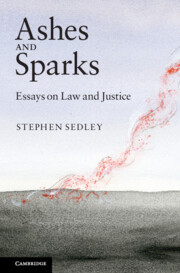Book contents
- Frontmatter
- Contents
- Preface
- Acknowledgements
- PART I History
- PART II Law
- 12 Justice miscarried
- 13 Breaking the law
- 14 Declining the brief
- 15 Big lawyers and little lawyers
- 16 Parliament, government, courts
- 17 Judges in lodgings
- 18 Mice peeping out of oakum
- 19 Justice in Chile
- 20 Never do anything for the first time
- 21 Rarely pure and never simple
- 22 Law and plumbing
- 23 The Laws of Documents
- PART III Justice
- Index
14 - Declining the brief
Published online by Cambridge University Press: 05 June 2012
- Frontmatter
- Contents
- Preface
- Acknowledgements
- PART I History
- PART II Law
- 12 Justice miscarried
- 13 Breaking the law
- 14 Declining the brief
- 15 Big lawyers and little lawyers
- 16 Parliament, government, courts
- 17 Judges in lodgings
- 18 Mice peeping out of oakum
- 19 Justice in Chile
- 20 Never do anything for the first time
- 21 Rarely pure and never simple
- 22 Law and plumbing
- 23 The Laws of Documents
- PART III Justice
- Index
Summary
This was a review, published in the London Review of Books in June 1992, of three books offering rather different angles on the practice of law: Judge for Yourself, by the maverick circuit judge James Pickles; The Barrister's World,a socio-legal study of advocates in the UK; and David (now Lord) Pannick's Advocates,a jobbing lawyer's book about jobbing lawyers.
The absurdity of ex-judge James Pickles is not that, the son of a mayor of Halifax and himself an Oxford graduate, he rails endlessly against the domination of the bench by the Oxbridge upper middle class. There's nothing wrong with being a traitor to one's class. As the left-wing QC D. N. Pritt told the right-wing Labour leader Ernest Bevin, it was the only thing the two of them had in common. No, what's odd about Pickles is that, as his book repeatedly reveals, he is an unimaginative authoritarian who has somehow managed to break all the rules in his private war against unimaginative authoritarians.
He appears not to see the slightest irony, after endless diatribes against the snobbery of the legal profession, in remarking: ‘There can be problems on one's release from prison as even Gerald Ronson will have found. Any hopes of an honour or title will have crumbled.’ Even Lord Lane could be forgiven for thinking it pretty rich to be called a dinosaur by the judge who jailed Michelle Renshaw for being too scared to give evidence and who sent Tracey Scott to prison for six months with her baby for letting her friends take goods through her supermarket checkout.
- Type
- Chapter
- Information
- Ashes and SparksEssays On Law and Justice, pp. 153 - 160Publisher: Cambridge University PressPrint publication year: 2011



